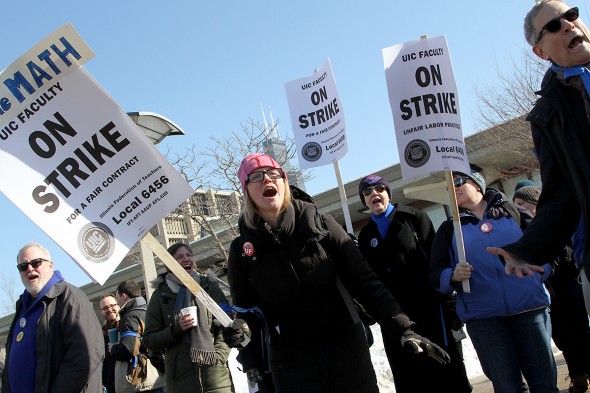Faculty union holds two-day strike on campus

Janet Smith, associate professor of urban planning and policy, rallies the crowd Tuesday in the Lecture Center Plaza. Photo: S.K. Vemmer/UIC News
UIC faculty members in collective bargaining units began a two-day strike Tuesday, scheduled to continue today.
The union and the university have not yet reached a contract agreement through negotiations with the help of a federal mediator.
UIC United Faculty, which represents about 1,150 tenured and nontenure-track faculty in separate bargaining units, called for faculty in the bargaining units to cancel classes to picket outside campus buildings and rally in the Lecture Center Plaza.
The bargaining units include full-time faculty in colleges other than Medicine, Dentistry and Pharmacy, who cannot organize under state law. Classes in those colleges are not affected by the strike, and campus health care facilities remain open.
The decision to strike is up to each individual faculty member, and campus officials did not know how many classes were canceled Tuesday.
The university said the academic calendar will not be affected by the strike, and students’ grades or graduation should not be affected. More information is available at facultycollectivebargaining.uic.edu
Negotiations between the university and the union began in August 2012 and moved to federal mediation last November. Three more meetings with the federal mediator are scheduled for Feb. 21, Feb. 24 and March 3.
About 250 faculty and students walked in a circle around the Lecture Center Plaza during the rally Tuesday.
Addressing the crowd, Joseph Persky, professor of economics and president of the faculty union, called for an end to the “gypsy labor market for lecturers.”
He said, “We still have lecturers making $30,000. They [university administrators] are bringing in $300,000.”
UIC has “unavoidables” like utilities and interest, Persky said. “Our raises are considered avoidable. Not anymore.”
Lon Kaufman, vice chancellor for academic affairs and provost, said in an interview that the length of contract talks “reflects that this is a first contract, and started with a blank page.”
“We have to get this right,” Kaufman said. “It will affect the university and its students for decades. I also believe that the faculty shares our concerns for the students.”
Some of the differences between the union and university positions relate to salary increases and base pay for tenured and nontenure-track faculty members.
University administrators have proposed a minimum tenure system salary of $65,000 in colleges that enroll students and $55,000 in colleges that do not enroll students, effective August 2014. The university proposed minimum salary levels for nontenured faculty of $34,000 in August 2014, to increase to $36,000 by 2016.
The faculty union is proposing a $60,000 minimum salary guarantee for tenured faculty members, effective August 2014, and a minimum $45,000 salary guarantee for nontenured faculty members, effective August 2014.
Jennifer Rupert, a lecturer who teaches first-year writing and gender and women’s studies, participated in the rally Tuesday. “I’m here to fight for my students’ right to a better education,” she said. “I want a livable wage so I can be a better teacher.”
Jesse McAdoo, a first-year graduate student in elementary education, agreed.
“I believe it’s a moral abomination that teachers are only paid $30,000, having to work second jobs to support their families,” McAdoo said.
Kaufman said the university has agreed that salaries for the lowest-paid non-tenure system faculty in particular must rise. The university offer now on the table raises the nontenure system minimum by 20 percent, he said.
How salary increases are allocated is also a matter of concern, Kaufman said.
“It’s important that raises be based on merit, and that we find a way to retain and reward the best teachers, which our students deserve,” he said.
Kaufman said the two sides have reached tentative agreements on several articles. The university “continues to bargain in good faith,” he said, adding that he looks forward to a settlement.
Janet Smith, associate professor of urban planning, is a member of the union bargaining team. “Yes, progress has been made, but it didn’t happen until we called for a strike,” she said.
The strike is the second in UIC history. Campus employees are represented by 24 separate bargaining units.
For more information, visit facultycollectivebargaining.uic.edu
– Gary Wisby contributed to this report
